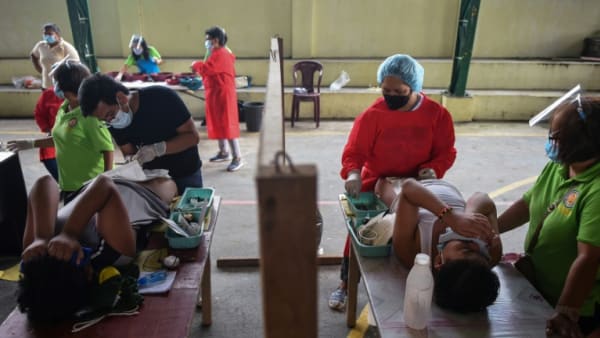
"I feel like I'm a genuine Filipino now because getting circumcised is part of being a Filipino," Gruta said after the 20-minute procedure.
Wearing masks and face shields, the boys sat on plastic chairs near a row of wooden tables surrounded by a red curtain.
Some looked excited or did their best to appear nonchalant. Others fidgeted as they waited.
After removing their shorts, the youngsters lay down on a table with their legs hanging over the edge and their groin covered by an operating sheet.
Some bit into a facecloth or covered their eyes as they were given a local anaesthetic. The surgeon then went to work.
"I got circumcised because they said I will grow taller and I will get better in sports," said 12-year-old Almer Alciro, who went to another outdoor clinic for his delayed procedure.
His family could not afford a private hospital where the operation costs as much as 12,000 pesos (US$240) - more than what many workers earn in a month.
While he waited for the free service to resume, Alciro's friends mocked him as "uncircumcised" - an insult similar to coward in a country where the procedure is a badge of masculinity.
"I'm happy that I'm finally circumcised," Alciro said.
DEMARCATING LINE
Circumcision has been practised in the Philippines for centuries, enduring wars and colonisations by Spain and the United States.
Male circumcision tends to be more common in nations with significant Muslim or Jewish populations, and less so in Catholic-majority places.
Yet around 90 per cent of males are circumcised for non-religious reasons in the Philippines, according to World Health Organization data.
Boys as young as eight face social pressure to go under the knife. Even hospital advertisements urge boys to "Be Man Enough".
Mass circumcisions are common during the hottest months from April to June when school children are on a long break.
Normally hundreds of boys undergo outdoor surgery on a single day, but COVID-19 rules have drastically reduced group sizes.
Many areas have yet to restart the free service as they battle COVID-19.
The delays have knock-on effects.
Circumcision is an important "demarcating line" between boys and men, when the youngsters take on more responsibility in the family and learn about sex, said Nestor Castro, a professor of anthropology at the University of the Philippines.
"Once a boy gets circumcised, he already leaves the position of being a child and he is now considered ... as an adult," Castro said.
"If you are a circumcised male ... you should act as a grown-up man, no longer as a young boy."
https://news.google.com/__i/rss/rd/articles/CBMiW2h0dHBzOi8vd3d3LmNoYW5uZWxuZXdzYXNpYS5jb20vYXNpYS9waGlsaXBwaW5lcy1jaXJjdW1jaXNpb24tY292aWQtMTktZGVsYXllZC1ib3lzLTIxNDQxMTHSAQA?oc=5
2021-08-30 02:49:00Z
52781847566609
Tidak ada komentar:
Posting Komentar